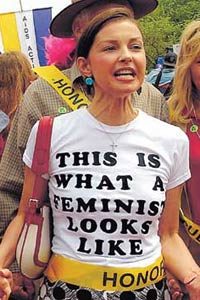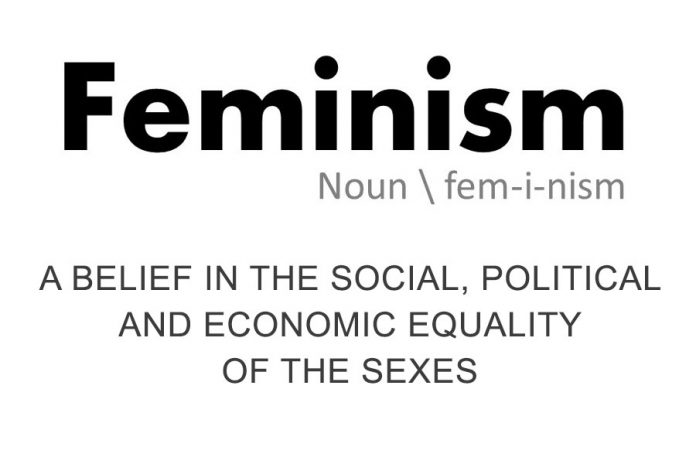The magazine “Working Woman” once defined a feminist as someone who pipes up “So what if Columbus discovered America? Queen Isabella gave him the money”, whenever within earshot of a male. Today we understand feminism as the advocacy of women’s rights and equality, a word that has always stood as a woman?s weapon of choice in the eternal battle of the sexes.
Feminism, similar to other -isms like capitalism, consumerism and communism that defined and shaped the 20th century has undergone constant scrutiny, analysis, criticism and subsequently evolution as it passed through different eras since its humble beginnings. The struggle for women’s rights began during the 18th century during a period of intense intellectual activity, known as the Age of Enlightenment. But even until the 19th century, the denial of equal rights to women met with only occasional protest and drew little attention from most people. Because most women lacked the educational and economic resources that would enable them to challenge the prevailing social order, women generally accepted their inferior status as their only option. World wide organized feminist efforts towards equal rights and sexual equality occurred in two major waves. The first began around the mid 19th century when in the US and elsewhere campaigned to gain suffrage- i.e. right to vote. The wave lasted until the 1920s when several countries granted women suffrage. The second wave gained momentum during the civil rights movement of the 1960s when the struggle by the Afro-Americans to achieve racial equality inspired women to renew their own struggle for equality.
 And today, as the world heads towards the 21st century feminism faces a question mark over its relevance. Today, the prospects for a young lady are undoubtedly brighter than it was when the first suffrage campaigners took to the streets. Also, the world today has more pressing issues at hand that makes the concern over feminism appear petty and insignificant. And most of these involve women and children too, but far from receiving the “rights” and “equality” which the feminists in their cozy offices and seminar halls lobby for, these women and children on the other side of the globe are dying of unnecessary violence, malnutrition civil wars. What is the relevance of having a conference dominated by lesbian abortionists in Washington DC when women were being raped and tortured in Darfur by the Hundreds? The millions of Dalit women in SE Asia whose pride and dignity are systematically stripped everyday by higher class townspeople don’t need feminists but a better Government policy and intervention. Also, is it really a sound idea for feminists to suggest that women be sent into the struggle for existence exactly as men?
And today, as the world heads towards the 21st century feminism faces a question mark over its relevance. Today, the prospects for a young lady are undoubtedly brighter than it was when the first suffrage campaigners took to the streets. Also, the world today has more pressing issues at hand that makes the concern over feminism appear petty and insignificant. And most of these involve women and children too, but far from receiving the “rights” and “equality” which the feminists in their cozy offices and seminar halls lobby for, these women and children on the other side of the globe are dying of unnecessary violence, malnutrition civil wars. What is the relevance of having a conference dominated by lesbian abortionists in Washington DC when women were being raped and tortured in Darfur by the Hundreds? The millions of Dalit women in SE Asia whose pride and dignity are systematically stripped everyday by higher class townspeople don’t need feminists but a better Government policy and intervention. Also, is it really a sound idea for feminists to suggest that women be sent into the struggle for existence exactly as men?
The world has changed since the first women’s rights campaigns, but women still remain at disadvantage, whether it is in politics, education, legal rights or economic status. In 1994 Governments of 10 countries were headed by women, but more than 100 countries had no female members in legislative bodies. Women constitute approximately 9 percent of the parliamentary representatives in industrialized countries while the percentage was 12 in developing countries. Women who make up about 32 percentage of the worlds labor force, hold 8 percentage top managerial positions in US corporations, while in the 1000 largest corporations outside US, women comprised only 1 percentage of the executive positions. While feminists get worked up over abortion bills, in fundamentalist Islamic countries like Iran, means of contraception are still illegal. In Canada where there is no overpopulation problem, abortion is illegal unless the life of the mother is illegal while China which encourages families to have only one child, places no restriction on when a woman can have an abortion.
Thus the status of women varies dramatically in different countries, and in some cases, groups within the same country, such as ethnic groups or economic classes. Therefore generalization on anything regarding women is impossible. For the work hardened mother of eight in rural Nepal, who has no other option but to work from dawn to dusk in order to make ends meet, Feminism doesn’t mean a thing. In the third world countries of Latin America, Africa and Asia, the fundamental principals of feminism that feminists claim to practice, is anything but relevant, as trying to push feminism there is a case of trying to run before you can walk. What good is feminism there when even the basic rights have not been safe guarded for the women there?
 The problem with feminism is that it generalizes too much. It assumes and tries to force the assumption upon the world that all women are victims of men, but unknown to them, while they try to uplift and help women they are actually undermining the ability of those they try to help to help themselves. Also, the third world needs a completely different approach towards feminism as opposed to western feminism.
The problem with feminism is that it generalizes too much. It assumes and tries to force the assumption upon the world that all women are victims of men, but unknown to them, while they try to uplift and help women they are actually undermining the ability of those they try to help to help themselves. Also, the third world needs a completely different approach towards feminism as opposed to western feminism.
Therefore, feminism is relevant only as long as headstrong feminists don’t use feminism as an excuse to slug it out with their arch enemies, the men, forgetting that there are things going on out there that are bigger than the world they live in. Complete and absolute equality between men and women will probably never turn into a reality, as some one had pointed out, “Nobody will win the battle of the sexes. There is too much of fraternizing with the enemy.” But in the meantime we can try to bring out the real feminists within ourselves; someone who knows for a fact that men and women are equal and wants society to wake up to the fact, so the world can stop operating at half-strength and so that half the brain, half the inspiration, half the human resources in the world will no longer be wasted.
– Rishav Bashyal










































